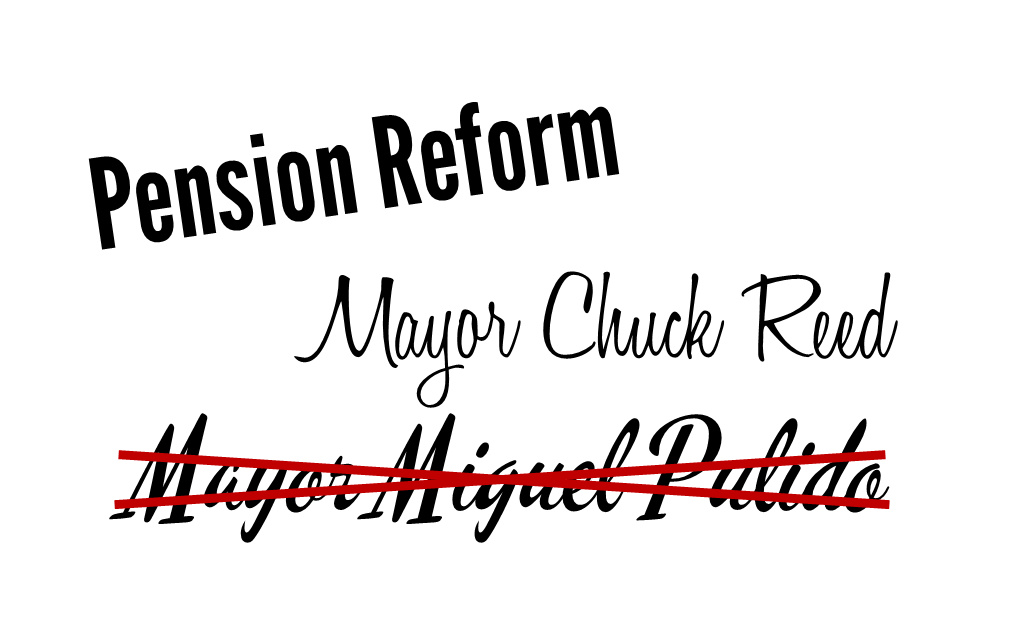Originally posted at The Liberal OC.
By Dan Chmielewski.
Sources tell the Liberal OC that Santa Ana Mayor Miguel Pulido has withdrawn his support of a ballot initiative led by Sam Jose Mayor Chuck Reed that would have a profound effect on pensions for public employee unions.
Mayor Pulido told Mayor Reed last week that he is pulling off of Reed’s proposed public pension ballot initiative and is no longer supporting the effort. The lone Orange County Mayor still backing this anti-union measure is Anaheim’s Tom Tait.
Pulido was initially lobbied hard by a number of other large city mayors to help support Reed’s effort, has “talked with a number of local labor leaders, become more educated on the detailed impacts of the initiative, and come to the conclusion that it is something he does not want to be supportive of.”
The proposed Pension Reform Act of 2014 would amend the California Constitution to give government agencies clear authority to negotiate changes to existing employees’ pensionor retiree healthcare benefits. The changes would apply “going-forward,” allowing employees to keep the benefits they earned to date but letting employers reduce what they’d earn for the remainder of their careers.
In June, Pulido and Reed offered an editorial that ran in the San Diego Union-Tribune on “The Pension Reform Act of 2014.” They wrote:
The skyrocketing cost of public employee retirement benefits is one of the greatest challenges facing cities and other government agencies across California today. Annual taxpayer contributions to CalPERS, the state’s main retirement system, have jumped from about $2 billion to nearly $8 billion over the past decade. Many non-CalPERS agencies have seen similar retirement cost increases as well.
Despite these rising contributions, the state’s retirement systems are significantly underfunded, with their collective unfunded liabilities for pension and retiree health carebenefits totaling hundreds of billions of dollars.
That’s why, four years ago, then-CalPERS Chief Actuary Ron Seeling declared that the cost of public employee retirement benefits was “unsustainable.” And without reform, these unsustainable benefits threaten to push more cities, counties and other public agencies into insolvency.
This is a problem that all Californians should care about. It is draining money away from core public services. It is increasing pressure for new taxes and steeper borrowing. It is preventing much-needed investments in infrastructure. And it threatens to leave our children and grandchildren with an enormous debt that they won’t be able to afford.
For example, when state spending on retirement benefits increases, it squeezes out funding for important services like education. The state’s retirement system for teachers, CalSTRS, recently stated it needs another $4.5 billion annually to reach full funding in 30 years. That will leave fewer dollars available for K-12 education, which has already seen fundingdecline by 12 percent over the last five years.
The impacts are even more apparent at the local level where personnel costs make up a large portion of the budget:
• In San Jose, our annual retirement contribution more than tripled over the past decade and now consumes more than 20 percent of the city’s entire general fund. These increased costs have forced us to lay off police officers and firefighters, close libraries and community centers, and watch our streets deteriorate year after year. We eliminated about 2,000 positions from our city workforce.
• In Santa Ana, the annual retirement contribution more than doubled over the past decade and CalPERS is currently projecting that the city’s pension rates will double again within the next six to seven years. These higher pension costs have been a contributing factor in Santa Ana having to reduce its full-time workforce by 41 percent over the past six years. While the city has been able to mitigate some of the increase through a cooperative effort with its unions — employees currently contribute beyond the standard 8 percent employee share — meaningful reforms to reduce current benefit levels and obligations in the near term are needed to protect Santa Ana’s ability to maintain services.
Pulido’s about face surely means local labor leaders told Pulido that his continued support for the measure would impact his labor support in any future election.





